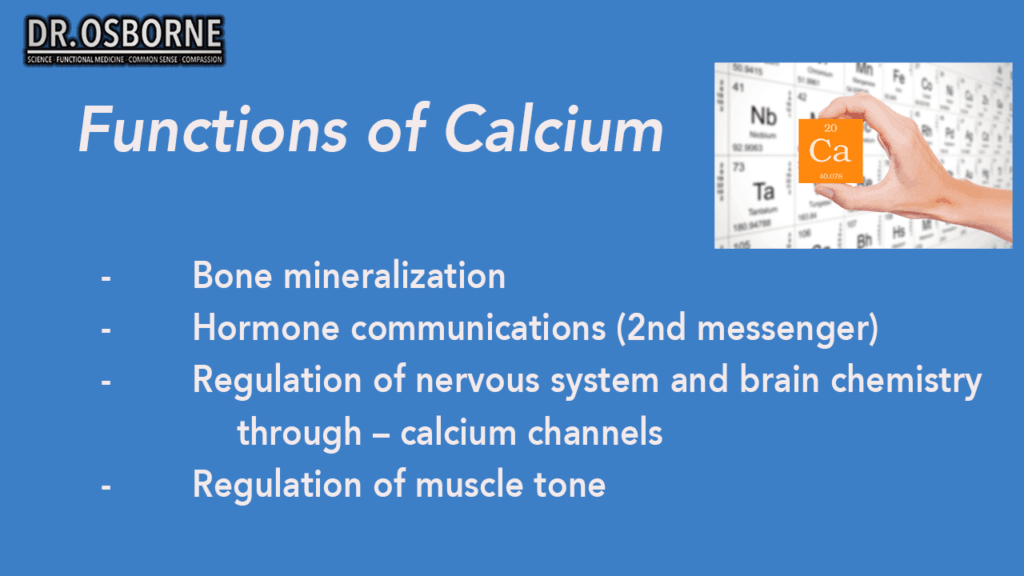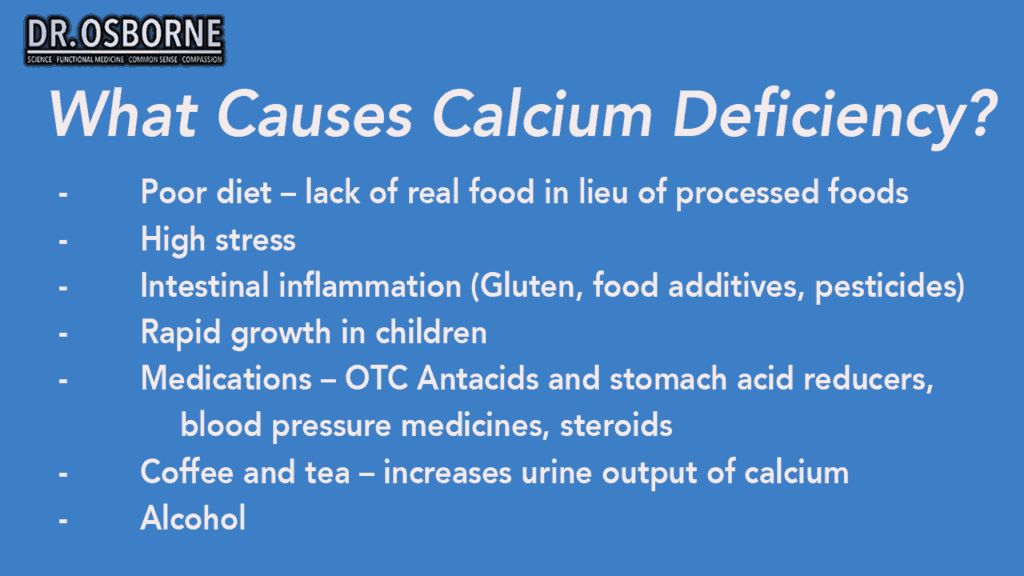
Calcium is the most prevalent mineral in the human body. It is essential, meaning the body cannot synthesize it, and it is vital for several functions within the body. And because gluten can damage the intestine causing malabsorption of nutrients, those with gluten sensitivity should be tested for calcium deficiency on a regular basis. Understanding the functions of calcium and what it does for your health will shed some light on why…
What All Does Calcium Do?

It’s common knowledge that calcium is beneficial for bone mineralization. In fact, 99% of the mineral in the body resides within the bones. The other critical 1% is found in the serum of plasma. If this level were to ever drop, the body would simply pull it from the bone.
Apart from bone mineralization, calcium has an essential role as a hormone messenger. This means that calcium is responsible for communicating hormonal messages to your DNA for their functions to be expressed. Bottom line, hormones are unable to work well without the assistance of calcium.
Other Functions
Calcium also serves as an electrolyte and plays a key role in the nervous system. At the end of each nerve, there is a calcium channel. When an electrical impulses travel down the nerve this channel is opened allowing calcium to flood into the nerve cell initiating the release of neural chemicals like serotonin, dopamine, and acetylcholine. These nerve chemicals allow for the communication between nerves.
In this role, it essentially acts as the on and off switch for nerves. Similarly, it also aids muscles in contracting and relaxing.
Where to Find Calcium

Another myth most are taught from a young age is that all of this nutrient comes from dairy. While it is true that dairy is a great source of it, it can be challenging to find dairy produced by cows that are not treated with chemicals, hormones, and fed genetically modified grain. Additionally, many with gluten issues commonly also react to dairy because the protein casein is similar to gluten proteins. Some people are allergic to dairy or choose to live a vegan or vegetarian lifestyle.
In these cases, it’s a necessity to find other sources of dairy, and fortunately, there are many out there. These include sardines, salmon, and bone broth (for non-vegan/vegetarians), cruciferous vegetables like broccoli, cauliflower, cabbage, and bok choy, almonds, figs, and dark leafy greens. A word of caution with leafy greens, however, is that they contain oxalate which can hamper the absorption of calcium.
Calcium Deficiency

Even though bone tissue is very rich in calcium, cellular calcium deficiencies are quite common. Especially in those with gluten issues. That’s why it is important to know the signs to look for. Some of the symptoms are so common, they can easily be attributed to other issues making treatment delayed and symptoms worse.
One of the most common signs of a deficiency, especially when combined with dehydration is muscle spasms, cramps, or tetany. Furthermore, a person with a deficiency may have fatigue in the muscles, as well as burning and pain, brain fog or recall issues, a short temper, irritability, agitation, less flexibility, excitable nerves, and a dampened hormone response.
Aside From Gluten Sensitivity, What Causes a Deficiency?
While the obvious cause of deficiency is a lack of the nutrient in the diet, there are several other factors, as well. One of these is drug or medication induced deficiency. Those on medication for high blood pressure are likely to have a deficiency, as well as those who regularly take antihistamines and antacids. These, along with alcohol, get rid of the acid in the stomach which is vital for the breakdown and absorption of it.
Having a diet too high in sugar or sodium can also cause a deficiency. With a high sodium diet, extra calcium is excreted through the kidneys. This can also happen when someone regularly consumes too much coffee, tea, or energy drinks.
Those at Risk of Deficiency
One of the greatest populations at risk for deficiency is children. Because their skeletal structures are growing so rapidly, their bodies need adequate supplies of calcium to keep up. Furthermore, children’s diets are often filled with processed food, limiting their access to proper amounts of it.
Another population at risk of deficiency are those that avoid sunshine and therefore do not get adequate vitamin D. Vitamin D is crucial for telling the intestines to absorb calcium and preventing the kidneys from excreting it. Similarly, those with gut or absorption issues may also find it difficult to get the proper levels of calcium, as well.
Diseases Linked to Deficiency
Without proper levels of this nutrient, the body cannot function properly, and there are several conditions or disease that could result. These include:
- Osteoporosis and Osteomalacia
- Rickets – while really a disease caused by a vitamin D deficiency, without vitamin D, it is not properly absorbed
- Kidney Stones
- Colon Cancer
- Neurological Depression
- Seizure Disorders
- High Blood Pressure
- Electrolyte Disturbances
Testing for Deficiency
At most annual check-ups, the doctor will check the calcium level within the serum. If this level is low, it typically indicates a parathyroid hormone problem, and therefore a vitamin D and calcium issue. The doctor may then order a parathyroid hormone test for further investigation.
Additional tests to look at calcium levels include the Lymphocytes Levels test to look inside the cell and make sure calcium is functioning correctly. A 25-OH D test looks at vitamin D levels to ensure the absorption of calcium is occurring. Lastly, a check of gut health could indicate a deficiency if one is found to have Crohn’s, celiac’s disease, inflammatory bowel disease, or any form of colitis, as these affect the ileum where calcium is absorbed.
Which Calcium Supplements are Best?

For those not getting enough calcium, your diet should be the first thing that changes. If one is still unable to get the recommended amount through proper nutrition, the next step is supplements. Calcium supplements should not exceed 1,000 – 1,200 milligrams a day and should be taken with a 2:1 ratio with magnesium. It is also important to check the label for fillers as they are sometimes a source of hidden gluten contamination.
When choosing a supplement, consider Calcium Citrate, Malate, or Orotate. Citrate is one of the best for getting absorbed in the GI tract, while Orotate works well at the intracellular level. Try to avoid supplements with Calcium Carbonate and if supplementing causes lethargy and fogginess, discontinue use immediately.
Explore the Options
If you are experiencing symptoms of a calcium deficiency, take a closer look at your diet. Explore changes in what you are eating and find new ways to incorporate calcium without dairy or processed foods. Consuming natural, whole foods will change your body from the inside out, from increased energy levels to improve on how you look and feel!
Resources:
- Piste, Pravina, et al. Calcium and its Role in Human Body. Int J Res Pharm Biomed Sci. 4. (2012): 2229-3701.
- Beto, Judith A. The role of calcium in human aging. Clinical Nutrition Research Vol. 4,1 (2015): 1-8.
- Li K, et al. The good, the bad, and the ugly of calcium supplementation: a review of calcium intake on human health. Clin Interv Aging. 2018 Nov 28;13:2443-2452.
- Peterlik M, Kállay E, Cross HS. Calcium nutrition and extracellular calcium sensing: relevance for the pathogenesis of osteoporosis, cancer and cardiovascular diseases. Nutrients. 2013;5(1):302–327.